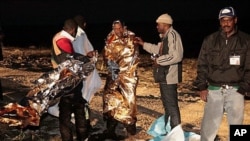The arrival of tens of thousands of migrants in southern Europe from North Africa has prompted a fierce debate within the European Union on how to deal with the influx. Some countries have begun reinstating border controls within the EU, despite a decades-old agreement on passport-free travel throughout much of the continent.
After five days on rough seas, these migrants have finally arrived on the Italian island of Lampedusa. The 800 migrants had set sail from Tripoli, packed into their aging fishing boat. Italian coastguards spotted the boat and helped them navigate into port.
Many of the arrivals are in desperate need of medical attention.
The inhabitants of Lampedusa, mostly fishermen, say they feel great sympathy for the migrants.
Today, Enzo Ochese is holding a party to mark the launch of his new fishing boat. Like many of Lampedusa’s people, he has helped care for some of the most vulnerable migrants. “I saw this small Nigerian boy, three-years-old [on one of the boats]. We took him home, we washed him, he was really happy. His mother was grateful. Lampedusa has always welcomed these poor persons. I think this is a really serious problem, I think the entire world, especially Europe, should assume the responsibility over this huge phenomenon, not just Italy," he said.
That sentiment is shared by the Italian government. It wants other European countries to share the burden of the migrant influx.
What is happening on this tiny outpost of Europe is having deep ramifications for the whole of the EU.
Many of the Tunisian migrants who have arrived in Lampedusa want to travel to France, which has close ties with its old colony.
But last month, a dispute erupted after French authorities prevented a train carrying migrants from crossing into France from Italy, an apparent breach of the EU’s Schengen treaty on open borders.
For several years, it’s been possible to travel without a passport from Finland in the north to Malta in the south. But the influx of migrants on Europe’s southern shores has prompted a debate here in Brussels over the re-introduction of border controls. And that challenges one of the central pillars of the European Union, passport-free travel across much of the continent.
At a recent EU meeting on the issue, there was disagreement over whether European countries should start reinforcing their borders.
EU Commissioner for Home Affairs Cecilia Malmström made her position on the Schengen agreement clear. “Schengen is a fantastic achievement that we have achieved in the European Union, and we should protect it and defend it. It is a beautiful achievement for the mobility of the people of the European Union," she said.
Human rights activists say Europe needs to do more to help the refugees arriving on its shores.
Anneliese Baldaccini is from the human rights group Amnesty International. “We have seen Europe taking only 5,000 people last year, the whole of Europe has taken, resettled 5,000 people from the global refugees population. They surely are not doing enough," she said.
But immigration has become a fiery topic in European politics - and analysts say agreement on what to do with the migrants once they arrive remains a distant prospect.
For now, the EU is reinforcing its external borders in places like Lampedusa.
With the uprisings in the Arab world creating turmoil on Europe’s southern borders, authorities expect no letup in the flow of migrants.




